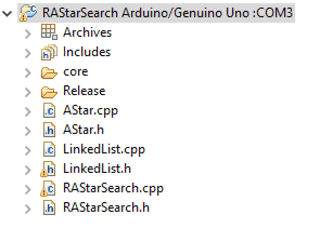I'm trying to create a linked list for use on the Arduino, in the Eclipse IDE with the Arduino/Sloeber plugin. The linked list is written in a .h and .cpp file, and included locally in the project.
However, when building, I get the error undefined reference to Structures::LinkedList<int>::LinkedList().
And despite the fact that I've added the local folder to the list of includes (and it can find the top level file containing setup() and loop()), the problem persists;
My relevant file listings are below. Any ideas of what settings I can add to Eclipse in order to solve this? Potentially, could it be something to do with the use of template<typename T> in the header file?
Thanks very much,
David
FYI: This problem does not occur with the core libraries i.e. I can run examples like Serial and Blink.
My top level .cpp is pretty simple:
#include "LinkedList.h"
#include "RAStarSearch.h"
#include "Arduino.h"
using namespace Structures;
void setup() { }
void loop() {
LinkedList<int> list = LinkedList<int>();
return;
}
And the referenced .h is:
#ifndef LINKEDLIST_H_
#define LINKEDLIST_H_
#include "Arduino.h"
namespace Structures {
template<typename T>
class LinkedList {
public:
/// Struct inside the class LinkedList
struct Link {
T value;
Link *next;
};
LinkedList<T>(); ///< Default constructor
void addValue(T val); ///< prepends new value at beginning of list
T popValue(); ///< returns first element and deletes Link.
Link* peekLink(); ///< Looks at first value
private:
Link *head; // this is the private member variable. It is just a pointer to the first Node
};
const int ERRNUM = 0x8000000; ///<Error number used, as exceptions not supported
}
#endif /* LINKEDLIST_H_ */
EDIT
On request I have included my code for LinkedList.cpp
#include "LinkedList.h"
#include "Arduino.h"
namespace Structures {
template<typename T>
LinkedList<T>::LinkedList() {
head = NULL; // set head to NULL
}
template<typename T>
void LinkedList<T>::addValue(T val) {
Link *n = new Link(); // create new Node
n->value = val; // set value]
if (head == NULL) { //i.e. if list is empty
n->next = head; // make the node point to the next node or NULL
head = n; // last but not least, make the head point at the new node.
} else {
Link *it = head;
Link *oldIt = NULL;
//TODO check edge cases i.e. insertion at beginning and end of list
while (n->value > it->value){ //until place in list is found, needs T to have > operator
oldIt = it;
it = it->next;
}
oldIt->next = n; //Set pointer to n
n->next = it; //Set n pointer to next
}
}
template<typename T>
T LinkedList<T>::popValue() {
T retval = ERRNUM;
if (head != NULL) {
Link *n = head;
retval = head->value;
head = head->next;
delete n;
}
return retval;
}
template<typename T>
typename LinkedList<T>::Link* LinkedList<T>::peekLink() {
return head;
}
}


